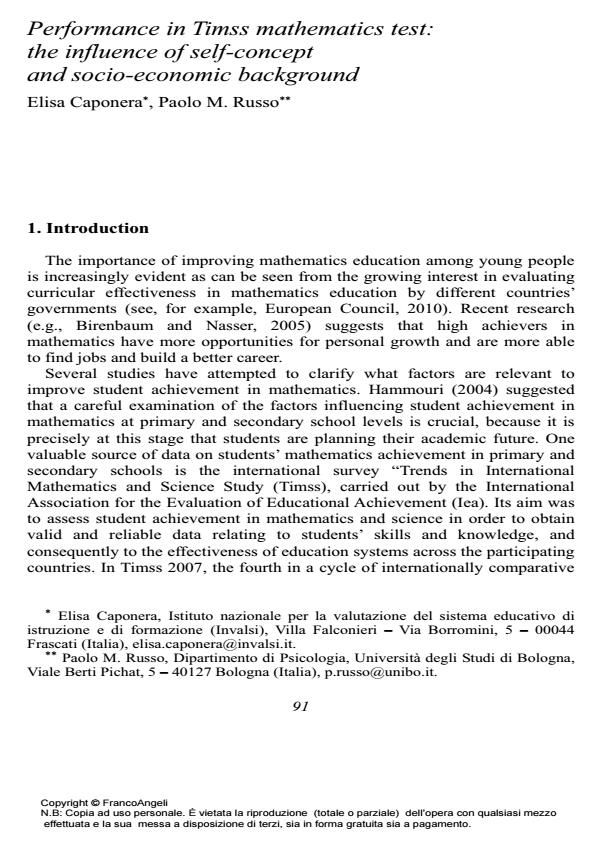Performance in Timss mathematics test: the influence of self-concept and socio-economic background
Journal title CADMO
Author/s Elisa Caponera, Paolo M. Russo
Publishing Year 2010 Issue 2010/2 Language English
Pages 13 P. 91-103 File size 306 KB
DOI 10.3280/CAD2010-002009
DOI is like a bar code for intellectual property: to have more infomation
click here
Below, you can see the article first page
If you want to buy this article in PDF format, you can do it, following the instructions to buy download credits

FrancoAngeli is member of Publishers International Linking Association, Inc (PILA), a not-for-profit association which run the CrossRef service enabling links to and from online scholarly content.
The purpose of this study is to evaluate the influence of students’ attitudes towards mathematics, mathematics self-concept and socio-economic status on their performance in Timss mathematics test. It also examined the relevance of the different schools’ characteristics for the prediction of students’ performance. We analyzed data related to 3997 Italian students of 170 schools, a representative sample of students in eight grade school, that participated to the Timss 2007. A multilevel analysis was conducted to distinguish how much of the variability of performance was due to student characteristics and/or to characteristics of schools and of the territorial context in which schools are located. The results showed that self-concept in mathematics helps to explain the differences in performance in mathematics. Further, the socio-economic status, at school level, contributed to the prediction of the performance in mathematics. Furthermore, in the Italian context, significant differences in performance depending on geographic area were evidenced.
Keywords: Mathematics achievement, mathematics self-concept, socio-economic status, multilevel regression analysis, Timss
- The influence of reading literacy on mathematics and science achievement Elisa Caponera, Paolo Sestito, Paolo M. Russo, in The Journal of Educational Research /2016 pp.197
DOI: 10.1080/00220671.2014.936998 - The development of statistical literacy skills in the eighth grade: exploring the TIMSS data to evaluate student achievement and teacher characteristics in the United States Jamie D. Mills, Charles E. Holloway, in Educational Research and Evaluation /2013 pp.323
DOI: 10.1080/13803611.2013.771110 - Kritická místa v matematice u českých žáků na základě výsledků šetření TIMSS 2007 M. Rendl, N. Vondrová, in Pedagogická orientace /2014 pp.22
DOI: 10.5817/PedOr2014-1-22
Elisa Caponera, Paolo M. Russo, Performance in Timss mathematics test: the influence of self-concept and socio-economic background in "CADMO" 2/2010, pp 91-103, DOI: 10.3280/CAD2010-002009